STEM is the future – and the future has already arrived. Jobs in science, technology, engineering and math (STEM) are projected to grow exponentially in the next decade. The facts are well known, collected and dissected by the STEM Education Coalition in Washington D.C., the National Academy of Sciences, the Pew Research Center, and others. All agree: Quality STEM education is key to growing the U.S. economy and vital to the country competing on the global market. But these same stats also expose the disturbing reality that diversity in STEM-related fields is sorely lacking.
The Florida-Georgia Louis Stokes Alliance for Minority Participation (FGLSAMP) aims to reverse the trend. The alliance’s stated goal is “to assist universities and colleges in diversifying the nation’s … STEM workforce by increasing the number of STEM baccalaureate and graduate degrees awarded to populations historically underrepresented in these disciplines.”
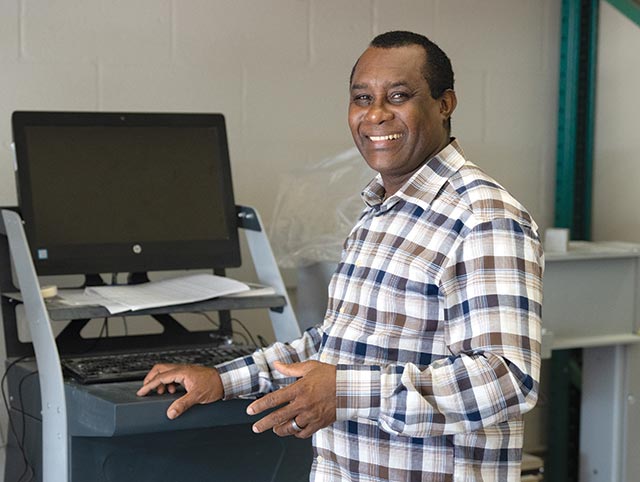
Composed of 14 Florida and two Georgia institutions, the program is one of more than 40 Louis Stokes alliances nationwide striving to do just that. Claude Villiers, professor of civil engineering in the U.A. Whitaker College of Engineering, came to FGCU in 2012, bringing the program with him.
As both an undergraduate and graduate student at the University of Florida and assistant professor at City College of New York, Villiers had some exposure to the program prior to arriving at FGCU. “I understood its benefits and wanted FGCU to be part of the program,” says Villiers, who serves as its director.
The alliance is about students interacting with role models and bonding with other students who look like them and who face similar challenges. “It’s the impact you can make on this group of students that is close to my heart,” he says.
“I think of FGLSAMP as a bridge to help students transition from undergraduate education to graduate school,” says Villiers, who estimates that the program has served a minimum of 10 students per year since its inception at FGCU. “(In 2021-22), we have 17 students enrolled in the program. For the most part, once students engage with the program, they stick with it until graduation.”
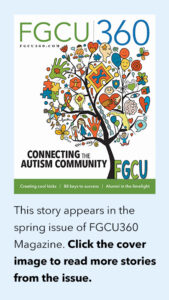 The criteria for participation are straightforward. Students must major in a STEM field, have a GPA of 3.0 and be a U.S. citizen or permanent resident.
The criteria for participation are straightforward. Students must major in a STEM field, have a GPA of 3.0 and be a U.S. citizen or permanent resident.
“Ninety percent of participating students are minority students, but we are not exclusive,” Villiers says. “If a non-minority student shows an interest and has the potential, we will accommodate that student.”
Coordinated by Florida A&M University and funded by the National Science Foundation, the program at FGCU recently received a five-year extension to its grant, totaling $100,000 ($20,000 each year), allowing Villiers to continue to distribute stipends to eligible students.
Funding eligibility depends on a student’s activity. The average stipend is $500. If, however, the student engages in undergraduate research and puts in significant lab hours, that student could be awarded as much as $1,000 or perhaps a bit more. Students track their hours and submit funding requests.
“By participating in this program, students have the opportunity not only to better themselves, but also to better society,” Villiers says, using their talents to fuel the economy not only of their local communities but far beyond. “Without this program, many students could be left behind. Maybe they do not go to a conference or conduct research with faculty. Maybe they don’t have the money for books or even gas,” he says. How students use the stipend is up to each one.
The highlight of the program, he said, is the opportunity for students to conduct undergraduate research, but there are many others – attending conferences, having access to informative webinars and networking with professionals in their field rank high on the list.
“As director,” Villiers says, “I communicate these advantages to faculty in engineering and the arts and sciences. They, in turn, recommend students they believe would benefit from participation.” Villiers then interviews students and assesses their interest and eligibility.
Here’s how it works: A cohort of students, often from different disciplines, meet once a month to support each other and share information.
“Sometimes students present their own research at these meetings,” Villiers says. “Other times, we invite a guest speaker.” Topics might include information on how to choose and apply to graduate school and how to make an effective scientific presentation.
“The program prepares students for grad school, but another measure of success is the number of students who engage in undergraduate research, something they might otherwise not have done,” he says.
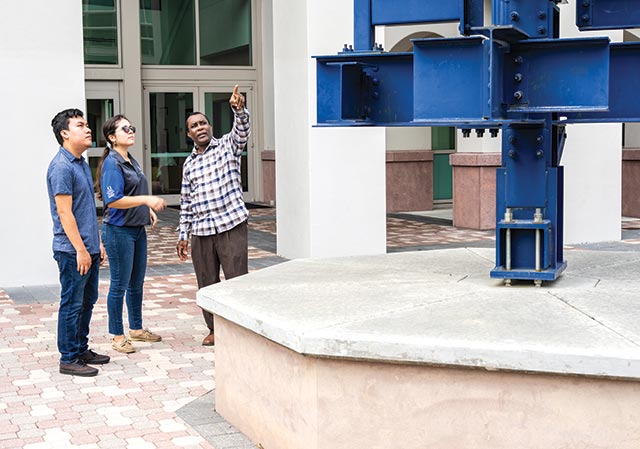
The program is named for civil rights attorney and advocate Louis Stokes, the first Black person elected to Congress in the state of Ohio back in the 1970s. In 1992, Stokes was part of a congressional initiative focused on supporting underrepresented populations in pursuing undergraduate degrees in STEM fields. Stokes served for 30 years.
Judging from the feedback of FGCU graduates who have pursued – or are pursuing – a master’s or doctoral degree after participation in the program, FGLSAMP has done its founder proud.
“What makes me most excited about the program,” says Villiers, “is the impact it makes on the students who go on to graduate school and have successful careers in the STEM fields. Many of these students might not even have considered STEM without their experience in FGLSAMP.”
Kelsey Sinclair – ’18, Biology
University of South Florida, ’19, M.S. Medical Sciences
Sixteen-year-old Kelsey Sinclair defied the odds by completing high school and college within six years, thanks to FGCU’s dual-enrollment program.
In 2014, Sinclair registered at FGCU as a high school junior and never looked back. After two years in the program, she earned her high school diploma while, at the same time, accumulating credits toward her bachelor’s degree. As a result, she was eligible to enroll in FGCU as a college junior, graduating with her bachelor’s degree in biology in 2018.
Make no mistake. That’s pretty heavy duty for a teenager, especially considering she also chose to participate in FGCU’s FGLSAMP program, an experience she credits for motivating her to pursue research as a career.
From that auspicious beginning, Sinclair went on to earn her master of science in medical sciences from the University of South Florida. Now she is a research technician in computational biology at the University of Florida. Her objective is to earn her doctoral degree in engineering.
“My ultimate goal is research involving prosthetics,” Sinclair says. “I have the background in biology, math and computer science, but to do what I want to do, I need engineering, because to build prosthetics you need both building and programming skills.
“Prosthetics is a tough field. Everyone with a disability is different. It’s not one size fits all. Building a prosthetic takes many skills,” she says. “If, for example, you’re building an arm, you need to know the nerves in the body, how a hand moves, what the prosthetic arm needs to be able to lift things up, to be stable and to carry loads like a normal arm would.”
Sinclair describes herself as a problem solver.
“I like things that are difficult. I like to think about the details – this specific person, this body, the size of this person. You don’t want the prosthetic to be too heavy or too small.”
Analyzing each client’s needs and attending to myriad details she says is critical.
“I think it’s a really cool field to get into,” Sinclair says, although that might rightly be considered an understatement.
Building prosthetics and changing the lives of others is not only a cool field, but also one that feeds the soul of both maker and recipient. It doesn’t get much better than that.
Jamie Gaitor – ’17, Biology
Carnegie Mellon University Ph.D. candidate, Chemistry
FGLSAMP plants seeds – of inspiration, of ideas, of useful resources, of possibilities and opportunities. Participants need only be mindful that the day to act will come when the time is right.
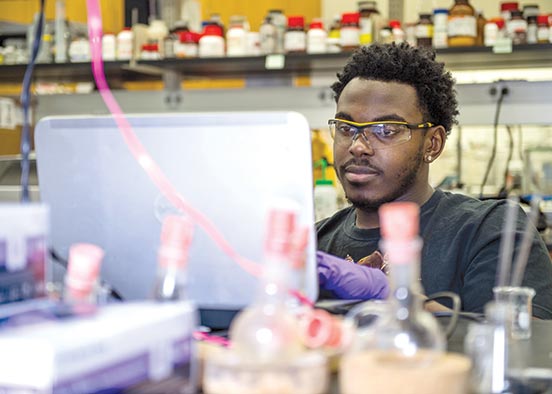
For Jamie Gaitor the day to act came some three years after graduating from FGCU. It was then that he recalled learning about the prestigious GEM Fellowship while participating in the alliance program at his alma mater. The GEM Fellowship supports graduate students interested in research or other technical careers in industry or academia and, reasoned Gaitor, it was a perfect fit for him. Subsequently, he applied for and received the award, which includes, among other things of value to a graduate student, a generous stipend.
Gaitor is halfway through the fourth year of his five-year Ph.D. program in chemistry at Carnegie Mellon University. “The [FGLSAMP] program definitely influenced my career path,” says Gaitor, who as a first-year and first-generation FGCU student had identified medicine as his goal. However, he says, “The regular meetings with other students similar to me, all of us learning about research together, bouncing ideas off each other … the experience was transformational.”
Gaitor credits Villiers and Associate Professor Arsalan Mirjafari, who teaches chemistry, with being crucial to shaping his career path. Pondering his future, Gaitor says, “I could choose to do a post-doctoral program followed by a career in academia, run a research group, and mentor students while teaching. Or I could choose to work for an industrial company, maybe in a national lab as a staff scientist.”
Whatever path he chooses, he expresses gratitude for his FGCU mentors and the FGLSAMP program for planting the seeds for success. One thing is clear. Whichever path he chooses, he is bound to make his alma mater proud.
Roshanak “Roshie” Gonzalez – ’19, Bioengineering
UC Berkeley Ph.D. Candidate, Neuro-engineering
Sometimes all it takes is a casual conversation and a wise listener with a simple suggestion. Take Roshanak “Roshie” Gonzalez. In conversation with Villiers, Gonzalez expressed an interest in research as a career option. Villiers took it from there and invited her to take part in FGLSAMP at FGCU. As director of the program, he knew only too well its value.
That simple suggestion led Gonzalez to work in Associate Professor Jorge Torres’ bioengineering lab, where she conducted research involved in detecting toxins in the air and identifying their specific chemical properties, a study originally funded by the Department of Defense.
After graduation, Gonzalez secured a prestigious two-year post-baccalaureate program with the National Institute of Health where she worked as a full-time researcher in the National Eye Institute’s Vision Lab, an experience that further fueled her interest in research as her calling.
Today, Gonzalez is a candidate for her Ph.D. at the University of California, Berkeley, where she is specializing in neuro-engineering.
“The single most pivotal factor to my being at Berkeley was my participation in the FGLSAMP,” she says. “I would not have been involved in undergraduate research until my senior year, but I started as a sophomore, meeting regularly with a small group of students in the same boat as I’m in; we were all minorities, all very supportive of each other.”
Gonzalez, who is half Iranian and half Cuban, said that together with her student cohort and with the guidance of educators and professionals, the enrichment programs and undergraduate research presentations, she has never looked back.
Gonzalez’ focus on movement disorders took shape early in life as she watched her mother, paralyzed from the waist down since age 2, exhibit such grace and courage despite her physical challenges. “Over the years, I’ve seen a lot of cool technology involving the brain, which controls everything else,” says Gonzalez, who wondered what the science of neuro-engineering might have in store for people who, like her mother, struggled with limited movement. To that end, Gonzalez envisions a career in either neuro-engineering research or education.
Francesca Moloney – ’14, Civil Engineering
University of South Florida, ’19, Ph.D. Mechanical Engineering
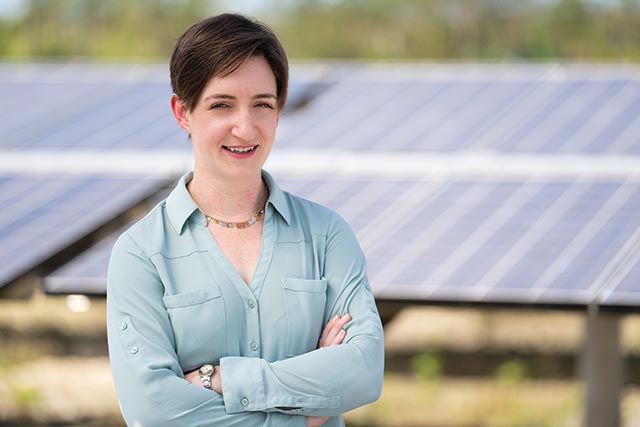
Francesca Moloney harbored no secret desire to pursue a Ph.D. or even a master’s degree. In fact, when asked, the first-generation student’s answer was a definitive “no.”
Fast forward eight years. Moloney is an innovation engineer for NextEra Energy Resources, “…the largest solar and wind provider in the nation,” says Moloney.
She is a member of the Juno Beach company’s team of technicians focused on developing sustainable solutions to the inevitable challenges central to the operation of electric vehicles. Among many issues, the team looks at innovating ways to increase battery storage, enhance renewable energy sources, and build a nationwide, sustainable infrastructure to serve private and commercial needs.
Needless to say, Moloney’s definitive “no” morphed into an enthusiastic “yes,” prompted by her participation in FGLSAMP while in her junior year at FGCU. Immediately following graduation, Moloney enrolled in a five-year Ph.D. program at the University of South Florida. Specializing in mechanical engineering, she earned her degree in 2019.
“My passion has always been solar and renewable energy,” Moloney says. “This is basically my dream job. If it wasn’t for supportive professors like Dr. Villiers and support from the FGLSAMP scholarship program, I would not be where I am today,” she says. “FGCU was family.”
